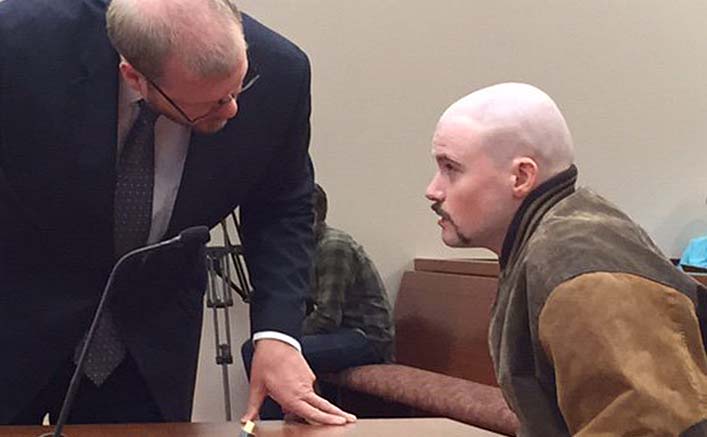AUGUSTA — It is now up to a judge to decide whether the state can forcibly medicate Leroy H. Smith III so he can be tried for murder in connection with the 2014 slaying and dismembering of his father.
Kennebec County Superior Court Justice Donald Marden said Wednesday he will rule in writing after reviewing arguments made in the case. It’s the first time a Maine judge has been asked to order the involuntary medication of a defendant to restore their competency under a state law that went into effect in July.
Smith’s attorneys, Scott Hess and Pamela Ames, object to the idea, saying that is not in Smith’s best interest, since he then would face trial on a charge of murdering his father in May 2014.
Smith, 26, of Gardiner, was arrested May 6, 2014, and has been held at Riverview Psychiatric Center in Augusta.
In January, Smith, who has been diagnosed with a delusional disorder, was found incompetent to enter a plea to charges he murdered Leroy Smith Jr., 56, in the Gardiner apartment they shared. Police say Smith told them he stabbed his father in the neck and head, cut up the body and placed pieces in trash bags, some of which he discarded in the neighboring town of Richmond.
According to information in an affidavit by Maine State Police Detective Jonah O’Roak, who sought an arrest warrant, the younger Smith told case investigators he killed his father and then “filleted him and buried him in the woods because his dad sexually assaulted him his whole life.”
There was no record of Leroy Smith Jr. on a sex-offender registry in the United States.
Smith has told authorities that he stabbed his father in the neck and head, cut up the body and put pieces in numerous trash bags, some of which he discarded in a rural area of neighboring Richmond.
He also said he rented a carpet steamer to help clean up the blood, and a neighbor saw the younger Smith walking along the road to his home with the steamer.
During testimony Wednesday, Miriam Davidson, a nurse practitioner at Riverview who is part of Smith’s treatment team, said the hospital would like to put him on antipsychotic medication for six months.
“It’s concerning to me that Mr. Smith has been on our unit for so long and has been untreated for his mental illness,” Davidson said. “It’s concerning that we do not have the ability to do that.”
She said that if involuntary treatment is approved, it would start with Xypresa, which Smith responded to during the most recent of two psychiatric emergencies when he presented a danger to others.
In November, Smith punched a mental health worker in the face as personnel attempted to give him antipsychotic medication, Davidson said.
She said Smith now refuses to participate in his treatment team meetings.
“He believes he’s being held inappropriately at the hospital,” she said. “I think he overall feels very persecuted most of the time.”
A letter in Smith’s court file from Davidson says “Smith has been diagnosed with a delusional disorder and medication is necessary and substantially likely to render Mr. Smith competent.” She also said that the side effects of the medication are unlikely to interfere with his ability to assist in his own defense.
Peter Donnelly, a clinical psychologist who did a forensic evaluation of Smith in July, testified Wednesday that Smith’s thinking “for the most part was logical.”
But Donnelly also said, at one point in the evaluation, Smith spontaneously claimed to be head of a kingdom and that his name was Icarus. He then made references to the bands Slayer and Phish, and said he “had to do something to save the world,” according to Donnelly.
In her closing argument, Assistant Attorney General Deborah Cashman said that involuntarily medicating Smith is appropriate both for restoration of competency and for his own health.
She suggested the judge order Smith medicated for at least six months and have a judicial review after four months.
One of Smith’s attorneys, Scott Hess, argued that the testimony offered Wednesday was insufficient to meet requirements of the new law, which says a judge must consider whether medication is in the defendant’s best medical interest and whether potential side effects could interfere with his ability to assist defense attorneys.
Send questions/comments to the editors.





Success. Please wait for the page to reload. If the page does not reload within 5 seconds, please refresh the page.
Enter your email and password to access comments.
Hi, to comment on stories you must . This profile is in addition to your subscription and website login.
Already have a commenting profile? .
Invalid username/password.
Please check your email to confirm and complete your registration.
Only subscribers are eligible to post comments. Please subscribe or login first for digital access. Here’s why.
Use the form below to reset your password. When you've submitted your account email, we will send an email with a reset code.